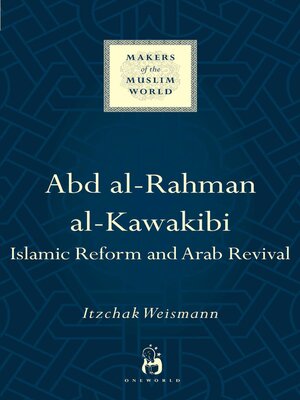Abd al-Rahman al-Kawakibi
ebook ∣ Islamic Reform and Arab Revival · Makers of the Muslim World
By Itzchak Weismann

Sign up to save your library
With an OverDrive account, you can save your favorite libraries for at-a-glance information about availability. Find out more about OverDrive accounts.
Find this title in Libby, the library reading app by OverDrive.



Search for a digital library with this title
Title found at these libraries:
| Library Name | Distance |
|---|---|
| Loading... |
Abd al-Rahman al-Kawakibi (1855–1902) was one of the most articulate and original proponents of reformist ideas in the Arab world, as well as a precursor of Arab nationalism. A journalist, political thinker and social activist from Aleppo, Syria, he was a sharp critic of both the scholarly and Sufi religious traditions, and of the autocratic Ottoman government of the day. Undeterred by persecution and arrest, he advocated returning to the model of the forefathers of Islam and was an overt supporter of liberty, an Arab Caliphate, and the separation of religion and state.
The first full-scale biography of Kawakibi in any European language, this work combines an account of his life with a fresh look at his writings, from the newspapers he founded in Aleppo to the books he published in Cairo. Drawing on memoirs of relatives and colleagues and on archival material, Itzchak Weismann demonstrates Kawakibi's originality and assesses his impact on the evolution of Islamic political thought and the course of Arab nationalism during the twentieth and early twenty-first centuries.
The first full-scale biography of Kawakibi in any European language, this work combines an account of his life with a fresh look at his writings, from the newspapers he founded in Aleppo to the books he published in Cairo. Drawing on memoirs of relatives and colleagues and on archival material, Itzchak Weismann demonstrates Kawakibi's originality and assesses his impact on the evolution of Islamic political thought and the course of Arab nationalism during the twentieth and early twenty-first centuries.







